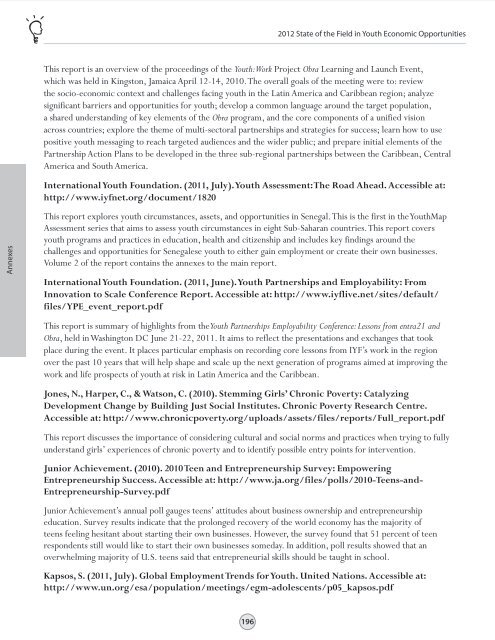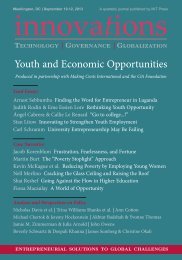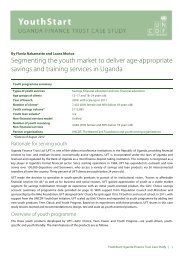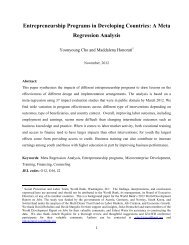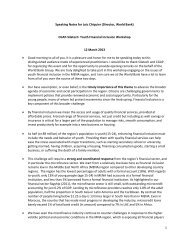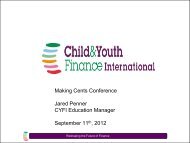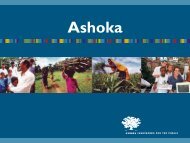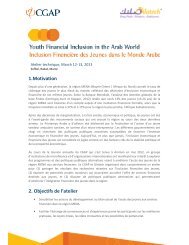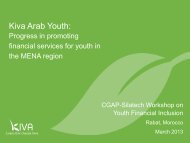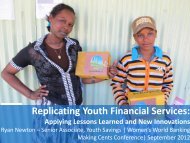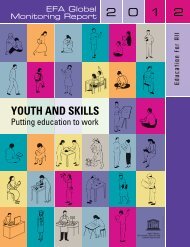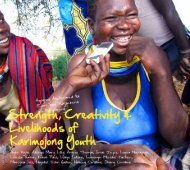STATE OF THE FIELD IN YOUTH ECONOMIC OPPORTUNITIES
STATE OF THE FIELD IN YOUTH ECONOMIC OPPORTUNITIES
STATE OF THE FIELD IN YOUTH ECONOMIC OPPORTUNITIES
You also want an ePaper? Increase the reach of your titles
YUMPU automatically turns print PDFs into web optimized ePapers that Google loves.
Table of Contents<br />
Chapter 1 Chapter 2 Chapter 3 Chapter 4 Chapter 5 Chapter 6 Chapter 7 Chapter 8<br />
Chapter 9<br />
Chapter 10 Chapter 11 Chapter 12 Chapter 13 Chapter 14 Chapter 15 Annexes<br />
2012 State of the Field in Youth Economic Opportunities<br />
This report is an overview of the proceedings of the Youth:Work Project Obra Learning and Launch Event,<br />
which was held in Kingston, Jamaica April 12-14, 2010. The overall goals of the meeting were to: review<br />
the socio-economic context and challenges facing youth in the Latin America and Caribbean region; analyze<br />
significant barriers and opportunities for youth; develop a common language around the target population,<br />
a shared understanding of key elements of the Obra program, and the core components of a unified vision<br />
across countries; explore the theme of multi-sectoral partnerships and strategies for success; learn how to use<br />
positive youth messaging to reach targeted audiences and the wider public; and prepare initial elements of the<br />
Partnership Action Plans to be developed in the three sub-regional partnerships between the Caribbean, Central<br />
America and South America.<br />
International Youth Foundation. (2011, July). Youth Assessment: The Road Ahead. Accessible at:<br />
http://www.iyfnet.org/document/1820<br />
Annexes<br />
This report explores youth circumstances, assets, and opportunities in Senegal. This is the first in the YouthMap<br />
Assessment series that aims to assess youth circumstances in eight Sub-Saharan countries. This report covers<br />
youth programs and practices in education, health and citizenship and includes key findings around the<br />
challenges and opportunities for Senegalese youth to either gain employment or create their own businesses.<br />
Volume 2 of the report contains the annexes to the main report.<br />
International Youth Foundation. (2011, June). Youth Partnerships and Employability: From<br />
Innovation to Scale Conference Report. Accessible at: http://www.iyflive.net/sites/default/<br />
files/YPE_event_report.pdf<br />
This report is summary of highlights from the Youth Partnerships Employability Conference: Lessons from entra21 and<br />
Obra, held in Washington DC June 21-22, 2011. It aims to reflect the presentations and exchanges that took<br />
place during the event. It places particular emphasis on recording core lessons from IYF’s work in the region<br />
over the past 10 years that will help shape and scale up the next generation of programs aimed at improving the<br />
work and life prospects of youth at risk in Latin America and the Caribbean.<br />
Jones, N., Harper, C., & Watson, C. (2010). Stemming Girls’ Chronic Poverty: Catalyzing<br />
Development Change by Building Just Social Institutes. Chronic Poverty Research Centre.<br />
Accessible at: http://www.chronicpoverty.org/uploads/assets/files/reports/Full_report.pdf<br />
This report discusses the importance of considering cultural and social norms and practices when trying to fully<br />
understand girls’ experiences of chronic poverty and to identify possible entry points for intervention.<br />
Junior Achievement. (2010). 2010 Teen and Entrepreneurship Survey: Empowering<br />
Entrepreneurship Success. Accessible at: http://www.ja.org/files/polls/2010-Teens-and-<br />
Entrepreneurship-Survey.pdf<br />
Junior Achievement’s annual poll gauges teens’ attitudes about business ownership and entrepreneurship<br />
education. Survey results indicate that the prolonged recovery of the world economy has the majority of<br />
teens feeling hesitant about starting their own businesses. However, the survey found that 51 percent of teen<br />
respondents still would like to start their own businesses someday. In addition, poll results showed that an<br />
overwhelming majority of U.S. teens said that entrepreneurial skills should be taught in school.<br />
Kapsos, S. (2011, July). Global Employment Trends for Youth. United Nations. Accessible at:<br />
http://www.un.org/esa/population/meetings/egm-adolescents/p05_kapsos.pdf<br />
196


